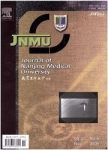Tcf7l1 promotes transcription of Kruppel-like factor 4 during Xenopus embryogenesis
Tcf7l1 promotes transcription of Kruppel-like factor 4 during Xenopus embryogenesis作者机构:College of MedicineHenan University of Science and Technology Department of Developmental Genetics Nanjing Medical University
出 版 物:《The Journal of Biomedical Research》 (生物医学研究杂志(英文版))
年 卷 期:2018年第32卷第3期
页 面:215-221页
核心收录:
学科分类:0710[理学-生物学] 07[理学] 08[工学] 09[农学] 071007[理学-遗传学] 0901[农学-作物学] 0836[工学-生物工程] 090102[农学-作物遗传育种]
基 金:supported by the Start-up Funding of Henan University of Science and Technology(13480027) to Q. C the Key Science Foundation of Nanjing Medical University(2015NJMUZD002) the Natural Science Foundation of Higher Education Institutions of Jiangsu Province(16KJB-180020) Natural Science Foundation of Jiangsu Province (BK20171053) National Natural Science Funds of China (81702747) to C.L
主 题:Kruppel like factor 4(Klf4) Tcf711 transcription regulation Xenopus laevis
摘 要:Kruppel-like factor 4(Klf4) is a zinc finger transcription factor and plays crucial roles in Xenopus ***, its regulation during embryogenesis is still unclear. Here, we report that Tcf711, a key downstream transducer of the Wnt signaling pathway, could promote Klf4 transcription and stimulate Klf4 promoter activity in early Xenopus embryos. Furthermore, cycloheximide treatment showed a direct effect on Klf4 transcription facilitated by Tcf711. Moreover, the dominant negative form of Tcf711(dnTcf711), which lacks N-terminus of the β-catenin binding motif, could still activate Klf4 transcription, suggesting that this regulation is Wnt/β-catenin *** together, our results demonstrate that Tcf711 lies upstream of Klf4 to maintain its expression level during Xenopus embryogenesis.



